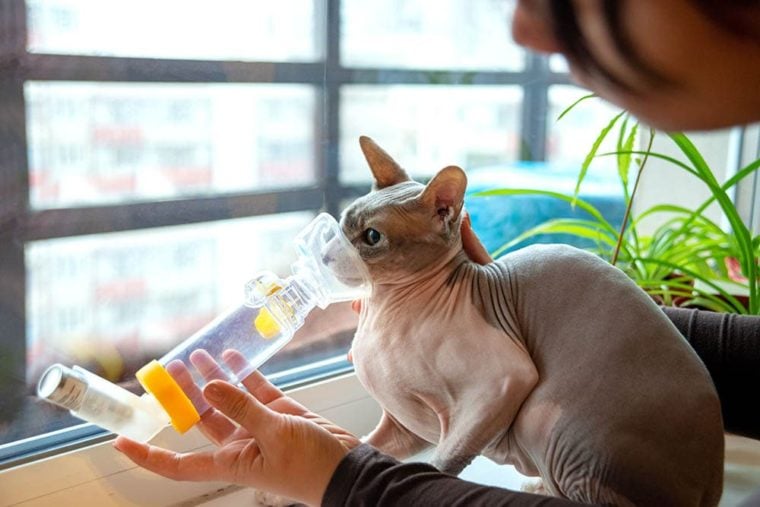
It might surprise you to know that it’s not just humans who can suffer from asthma. Feline asthma affects approximately 5% of cats and can have devastating consequences if not managed properly.1
Understanding feline asthma is the first step to improving your cat’s quality of life and ensuring that they live for a long time. If you suspect that your cat has asthma or if they’ve recently been diagnosed by a veterinarian, this guide will help you better understand what to expect.
What Is Feline Asthma?
Believed to be the result of an allergic reaction, feline asthma is much the same as the human type. It can affect cats of any age, sex, or breed. When your cat inhales an allergen, it triggers their immune system to have an overactive response that leads to inflammation. This causes the airways to constrict, restricting your cat’s ability to breathe.
Your cat can suffer from acute (sudden) or chronic (long-term) asthma. The signs can range in severity from mild, where they rarely interfere with daily life, to life-threatening.
While cats of any age can suffer from asthma, most are diagnosed between the ages of 2 and 8.
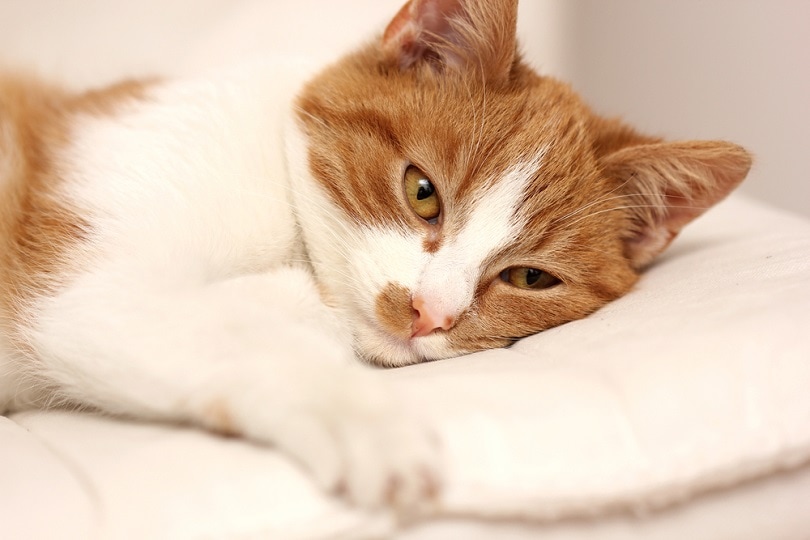
What Causes Feline Asthma?
The cause of asthma—whether in humans or felines—is difficult to determine. Researchers mostly agree that feline asthma is a result of an allergic reaction, but beyond that, there isn’t much certainty about why some cats suffer from asthma, and others don’t or why the signs range in severity depending on the individual.
Determining the triggers for asthma attacks is easier, and knowing what sets off your cat will help you prevent future attacks.
Common allergens that cause asthma attacks are:
What Are the Signs of Feline Asthma?
The signs that your cat can suffer from can vary depending on the severity of their particular case. One cat may have milder signs, while another might have more frequent attacks that can be near-fatal. Educating yourself on all the signs and their level of severity will aid you in diagnosing the problem and ensuring that you choose the right treatment.
The signs of feline asthma include:
It’s important to remember to ask a veterinarian for advice when you suspect that your cat has asthma or other underlying health problems. The signs of asthma coincide with several other common illnesses, including heartworm, respiratory infections, lungworm, and obstructions caused by foreign bodies.
Determining which health issue your cat is suffering from requires a diagnosis from a trained veterinarian. They’ll be able to run the right tests to ensure an accurate diagnosis.
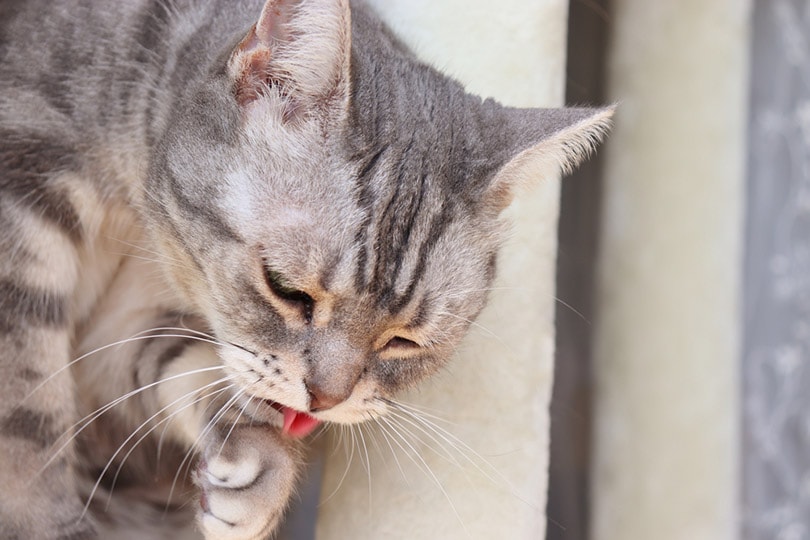
What Does a Feline Asthma Attack Look Like?
Feline asthma attacks are often mistaken for hairballs. When they’re suffering from an attack, your cat will hunch down to the ground, extend their neck, and cough or wheeze. With how similar the attacks are to coughing up hairballs, it’s important to pay attention to other signs, such as blue gums and lips or rapid and shallow breathing.
Asthma attacks can affect your cat when they’re asleep, too. They can be recognized by rapid breathing. This is usually more than 40 breaths per minute—most cats take between 24 and 30 breaths when they’re resting. Snoring or loud breathing isn’t usually an indication of an attack, but if your cat is having difficulty breathing, you should contact your veterinarian.
Serious asthma attacks can be accompanied by drooling, foamy mucus, and difficulty breathing. It’s important to remember to stay calm during a feline asthma attack. This will help you properly reassure your feline and get them to a veterinarian if you need to.
How Is Feline Asthma Treated?
For both felines and humans, asthma can’t be cured. However, the signs can be managed with a careful and dedicated treatment plan tailored to your cat’s case and its severity. There are several methods that you can use to treat your cat’s asthma.
Diet
Obesity can increase the risk of your cat developing other health issues and can exacerbate your cat’s asthma. Making sure your cat gets enough exercise, especially if they’re an indoor cat, and moderating their meals and snack intake will help you monitor their weight properly. Ensuring that they have a balanced, healthy diet of high-quality cat food—the amounts tailored to their activity levels—is the best way to help them stay healthy.
Medication
Asthma requires diagnosis by a veterinarian. Once they’ve run the tests, they need to rule out other health problems to better determine your cat’s illness and prescribe the right treatment.
Bronchodilators and corticosteroids are popular methods of managing more severe cases of asthma. They help open the airways and reduce inflammation, respectively.
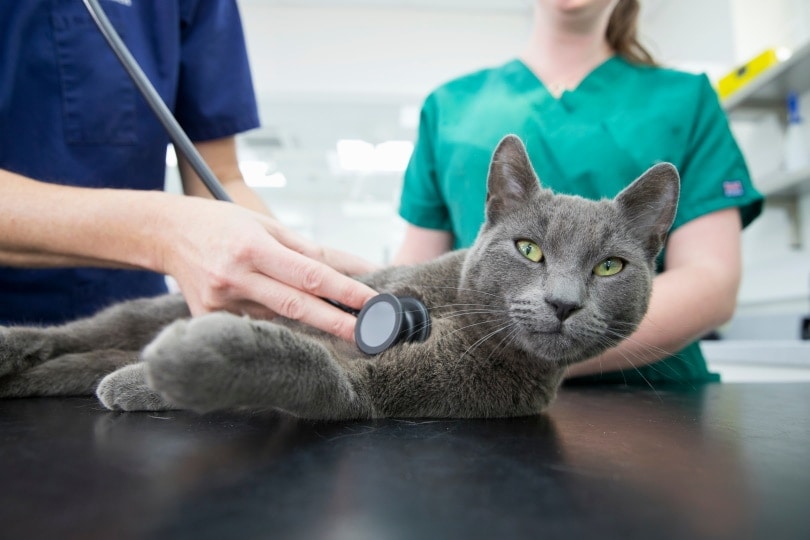
Natural Treatments
Although they’re not proven to be as effective as prescribed medications and are sometimes considered experimental, there are a few natural treatments that you can try.
Immunotherapy arranged by your vet is where you slowly desensitize your cat to the allergens that set off their asthma and is one of the more common alternative treatments. Omega-3 fatty acids have also been known to lessen inflammation and can be useful in the case of your cat’s asthma too.
Reduce Stress
Like obesity, stress can do more harm than good. If your cat is feeling stressed due to a visitor, a house move, or you redecorating the living room, they can be more at risk of having an asthma attack.
Above all, cats—and dogs, too—love routine. There’s nothing that they enjoy more than knowing exactly when their meals are served, when you go to work, and come back home for cuddles. Interruptions in this routine can throw them off their game. That’s why it’s so important to reassure them whenever something new is going on.
If you’re moving to a new house, keep your cat’s favorite pillow or blanket close by. They’ll still be nervous about all the commotion, but they’ll have somewhere familiar to curl up to stay out of the way.
Some cats can handle stress and unexpected situations better than others. But no matter how well your cat adjusts to events, try to keep their routine as stable as possible.
Remove Allergens
This can be easier said than done, especially if you live in a particularly dusty neighborhood or it’s springtime, and the plants are all in full bloom. There are ways that you can give your cat an allergen-free environment, though. Regularly vacuuming your house, along with steam cleaning or mopping hardwood or linoleum floors, will help you stay on top of the amount of dust in your home.
You can also invest in an air purifier to reduce the number of airborne allergens in the house. This also has the benefit of removing lingering smells surrounding your cat’s litter tray.
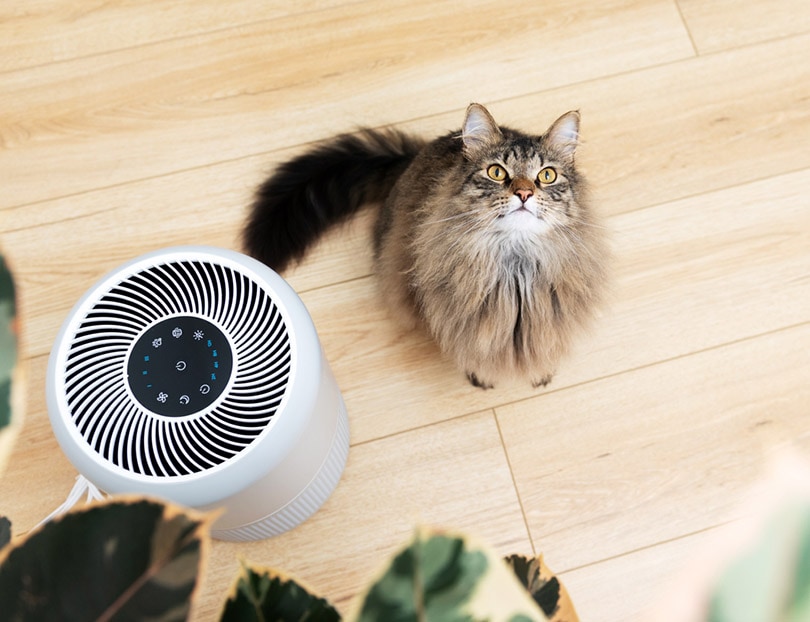
How to Prevent Feline Asthma Attacks
Since asthma can’t be cured, it’s unlikely that you’ll ever stop your cat’s asthma attacks completely. You can, however, help prevent the likeliness or severity of their attacks. It may require a few changes in how you live at home, but it’s all for a worthy cause.
Here are prevention methods that you can try:
Conclusion
Feline asthma affects 5% of cats and can be just as serious for them as it is for us. The signs are easy to recognize but can also be a result of other medical conditions, so it’s important to contact your veterinarian to rule out other causes of their signs to properly diagnose your cat’s asthma. An official diagnosis is the first step in successfully managing your cat’s signs.
Featured Image Credit: RozochkaIvn, Shutterstock








